Test Drive Diary - 2022
31.03.2022 N69°11', W 103°32' Odometer reading 2810 km.
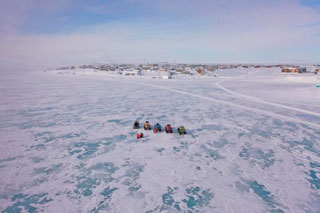
Morning. 5.00. It's dark. Yesterday we made good progress to the west, and the time on my watch ceased to correspond to the daylight. But captain's word is law, hence - reveille, and no objections. The finish line is not far; therefore, as a preventive measure against the evil eye, we filled the water tank with snow, knowing that in this case the chances of avoiding road troubles increase significantly. And if you only say, or just think loudly, that nothing is needed and we will be at the hotel soon - then all is lost. In the morning we filled thermos flasks with boiling water in order to warm up the radiator of the yellow vehicle, but it got started immediately with half a turn - out of spite, of course. We begin to regard the vehicles as animate beings, this is a kind of medical symptom already. Dawn broke. On a small frozen lake we stopped in order to practice retrieval of the vehicle from water to ice. Of course, it is an imitation only, because liquid water in freshwater lakes cannot be reached in winter in this blessed region. Superfluous tests are never superfluous, and our case has confirmed this statement. The tip of a new ice anchor bent under good tension, Zaitsev made a cutting of it with a gentle hand, and everything worked. It was found out that the steel tips of "Λ"-shaped pillars are too long, and one of them bent in hard freshwater ice, even though it was made of high-grade steel; again cutting, it's a useful thing after all! It worked! As for the rest, everything was fine: the manly faces of polar nomads in the rays of the rising sun, the operator working with risk of amputation of his frozen fingers, turning the handle of his device in ecstasy, Andrey Ivanovich inspiringly introducing TV viewers to our future feat. By 11:00 the body of the author of these lines, exhausted by important tests, together with the entire caravan was delivered to Cambridge Bay, where our run of this year was finished.
That's how the matters are. With greetings from the glorious province of Nunavut, yours, V. Ye.
30.03.2022 No wind, clear, -32°C. N70°27', W 099°24'. Odometer reading 2562 km. Daily run 248 km.
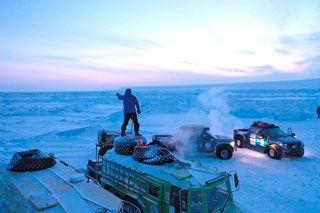
I wake everyone up at 5 o'clock in the morning, and moreover, according to the time of a different time zone which suits us better in regard of the coming dawn. The team members are not delighted about this, while I have senile insomnia. I am shy to tell everyone about it and use it for sordid motives, let them think that I have iron will and that sort of things. After ritual dances with gas burners around the radiators, we departed. Today the road is merrier, once I even accelerated the green oldie to 60 km/h. But it is just to remember youth. We have trailers on our tails, and high science, the ice radar, so, we need to be frugal. Anyway, our task is to arrive to Cambridge Bay and prepare the vehicles for the main travel of the next year. By the evening I experienced driving the Ford, the poor thing is riding over snow with great difficulty, the pressure on the ground is too big compared to our vehicles. Andrey Ivanovich sat to the right from me (we changed his patronymic for the correct one, as his middle name is John), the conversation turned out to be interesting again.
So, in informative conversations, another day disappeared in the darkness of times.
With greetings, V. Ye.
29.03.2022 N71°13', W096°46' Odometer reading 2400 km, from Resolute - 400 km.
No wind, clear, - 32°C. In the morning, for the purpose of fighting with frost, we start by warming up the engine radiator and the power steering cooler with a gas burner, only then the engine is started. Today is the day of riding over sleeping policemen. There are about 10 policemen (snow ridges) for every hundred meters of the route. For a daily run of 165 km, we calculate the number of policemen who got under my wheels - 16500. In the afternoon we had to replace a wheel on the Ford, a cut tire. There was a sharp stone somewhere. The ice radar got loose on the brackets, perhaps that is the revenge on behalf of the policemen. We tightened the fasteners and drive further on.
That's how the matters are. V. Ye.
27.03.2022 N71°57', W 095°16', Odometer reading 2220 km. 7:00 a.m., clear, frost about -40°C.
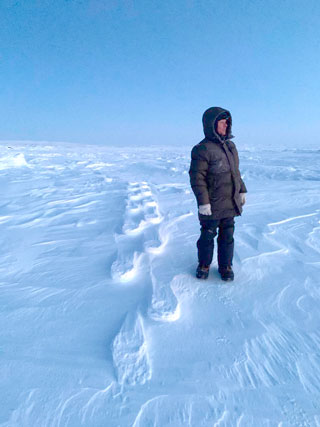
Problems in the morning with the engine cooling fluid and power steering fluid - it thickened, froze. We lost about an hour while warming up with a burner. In the evening we passed the time with Andrew (who was renamed into Andrey Evgenievich), Maxim and Zaitsev. We drank a sip of vodka, ate sliced frozen nelma (stroganina). It's scary even to think what might have happened to us without this simple and healthy food - maybe scurvy, and in whole - complete turning savage and, as a consequence, final loss of human appearance. During the meal Andrew and I discussed the problems of school education: whose methodology is better - Montessori or Steiner, we recollected Irvine and Mallory who disappeared on the slopes of Mount Everest in 1924 - all in all, there was no shortage of topical themes for gentlemen sitting in a nomadic waggon in the middle of ice desert. We were very lucky to have Andrey Evgenievich (Andrew) as a companion, he is a former racing driver, understands excellently the machinery, intricacy in the operation of aggregates at low temperatures. We are staying opposite to Bellot Strait, the key section of the entire Northwest Passage. Just 35-40 km to the east of us, at the other end of the strait, two huts of Hudson Bay Company are located, the Fort Ross. But now we are in a hurry, maybe next time we will get there to touch history. We are examining closely the satellite images sent to us by Emil, we will go to the zone which looks darker in the picture in order to measure ice thickness, perhaps it is thinner there. We set off. We measure. 173 cm. Hence, the finding: in order to determine even roughly the ice thickness from satellite image, we still have to learn and learn. Black zones mean open water. While dark-gray zones are a puzzle, whether it is smooth ice, without hummocks, or it is ice of different thickness. It is still about 80 km to the place of the Ford's wreck. About four o'clock in the afternoon we arrive to the place of the accident. There is a narrow, a kilometer and a half, strait between islands, and a strip of thin (15 cm) ice in it. In my opinion, it is difficult to understand and explain where this trap came from and how it was formed. If only the current has washed the ice from below. The vehicle is lying at a depth of about eight meters, it is perfectly visible. We took pictures of it, drove up to the surviving pickup. We messed for some time with starting its engine, refueled and drove further on. Green vehicle first, followed by red vehicle with ice radar on the tail, and then the Ford. After short wrangling, we decided to divide heroism with Andrey Evgenievich by half. At first I drive for a little, then he. So, in troubles and worries, another working day passed.
Yours, V. Ye.
26.03.2022 N74°10', W095°50'
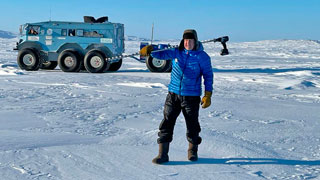
We departed from Resolute only at 14.00, while the schedule was - immediately after breakfast. The expedition, as it is. In a day, or rather in half a day, we covered 102 km. The weather is clear, the wind has calmed down completely by evening. We drive over our old trail back to Cambridge Bay. The day before yesterday the wind was very strong, it created a lot of snow ridges (zastrugi), and we are riding across the troughs, as usual in this life. We were given a box of delicious food for the road from the canteen of Resolute hotel, even cans with crab meat and other tasty meals. Today we drilled ice and compared its thickness with the readings of the instrument. The measurements match perfectly, the radar works excellent at ice thickness of about 1 m. Later we will test its operation on other thicknesses. This is of high priority for us in the context of evacuation of the Ford that stays in the zone of problematic ice thickness. So, our science activities are not only academic and fundamental, but also applied. This fact increases our self-assessment, but, seemingly, only in our own eyes.
With compliments, V. Ye.
24.03.2022 We are working in the garage.
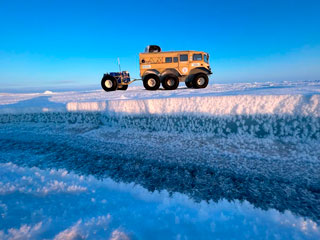
Our tasks have changed, we need to leave in Resolute every thing without which we can get to Cambridge Bay and return back. This applies to spare parts as well as to foodstuff. The work is tedious, especially the doctor's work, with foodstuff, but for us it is also not easy to guess - what should be left and what should be taken with us. The doctor, with subtle humor typical for him, asserted the idea that the other Ford with the trailer that remained at the accident site will not stay there till our arrival, it will be stolen. We leave in Resolute one trailer and tires, we take only two spare assembled tires. The doctor leaves a mountain of food. We launder our clothes preparing for the sea; considering the circumstances, it is better to be in clean shirts in case of emergency. Our task now is to get to the accident site, to document everything as scrupulously as possible, and take the surviving Ford with us (if, beyond expectations, it is not stolen yet). Everyone wants to show heroism and queue up in the desire to become its driver. I am thinking over the sequence of movement of the vehicles aimed at the highest safety for the heavy Ford. Green vehicle will go first, followed by ATV with ice radar on a trailer, then the pickup. We will drill the ice a couple of times, compare it with the readings of the instrument and, hopefully, everything will click into place.
That's how the matters are. V. Yelagin from Resolute settlement.
23.03.2022 Resolute. Actors are the same.
Vikings on the Fords departed back to Cambridge Bay - Yellowknife today at 10.30.
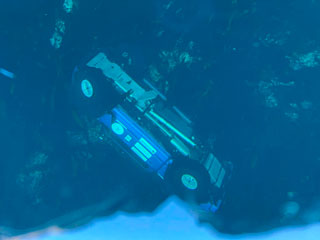
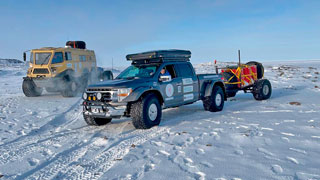
While we headed to the garage, to rest. The yellow vehicle was overheating yesterday, the driver was enthusiastic driving on smooth fast ice. Things happen. I hope no consequences will follow. The day passed in bustle, as usual, then dinner, sleep. At 0.30 - knock on the door. Andrew and Maxim came with news not of the best quality. At about 22.30 the blue Ford, in which Torfi was the driver, broke the ice and got drowned. Torfi and Brandon, the hunter, managed to jump out. The Fords drove over our old trail. All the night we were in the dark about the situation. Emil Grimsson took all coordination upon himself. The accident occurred in the middle of the route from Resolute to Cambridge Bay, about 450 km away from us. For our ATVs it would be a 20-hour journey. We didn't know what equipment they had - sleeping bags, a tent, whether they could make a hot drink for themselves. The vehicle that got drowned was the second on the route; the first vehicle with a trailer managed to pass the bad place, but disturbed the ice, its integrity. The weather in the morning was very windy, but in the middle of the day the guys were safely taken off by helicopter. Now it is possible to say "Welcome to Canada" again, but this time in a tonality that is radically different. Since that moment the rush for us was finished, as well as our plans to look for adventures and open water in the northwest of the Canadian archipelago. It became clear that by the time of the main travel the core of the team will have to be taken aboard in Cambridge Bay, since it is problematic to guarantee safe passing of the section Cambridge Bay - Resolute on vehicles that do not have positive buoyancy. It should be added that the condition of snow during our journey was, if not ideal, definitely more than merciful. And snow is the substance that causes the most trouble to vehicles of Arctic trucks class. And remember that the core of the team will have to be delivered by a certain date at the beginning of the main travel. Most important is that the humans remained unharmed, the bear did not bother them, apparently, it was just rambling nearby, so this time things settled safely again.
That's how the matters are. With kind regards, V. Ye.
22.03.2022 Resolute. I haven't been here for 8 years.
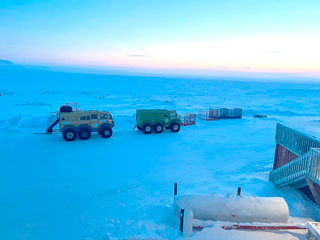
Mike became older, he no longer works in his wooden workshop, lives in a modest house, but is as cheerful and merry as before. We were accommodated in a good hotel, much more comfortable than in 2013 and 2014. The food is excellent. A cold workshop was provided for maintenance and storage of the vehicles till the next year. The workshop has powerful diesel-fueled heat guns that make noise like a jet plane with afterburner, but they warm this hangar successfully.
The Vikings will depart for Cambridge Bay tomorrow. While we'll rest for half a day, and then go to the garage to service the vehicles. The doctor will sort the products, and we shall sort spare parts and gear. In a couple of days we are planning to drive to northwest in search of open water and adventures. Accommodation in the hotel by rooms: Andrew, I and the doctor, Obikhod with Maxim and Boris, four tractor drivers in one cell. The weather is windy (if mildly speaking), it is cold. An impudent arctic fox lives under the hotel building, it is reasonable: a place abundant with food, close to containers with canteen wastes. In the evening Zaitsev's camera recorded the creature trying to get into our vehicle for food confiscation purposes. He failed to open the door, and besides he was too small. We have plenty of foodstuff, and we could feed the rascal, but environmental science strictly forbids that. Therefore, the warmth, light and kindness that our team carries with care in our calloused souls on our long-suffering, but still wonderful planet, will have to be granted entirely to representatives of our species.
That's how the matters are. V. Ye.
21.03.2022 Odometer reading 1728 km, N737°06' W0957°52'
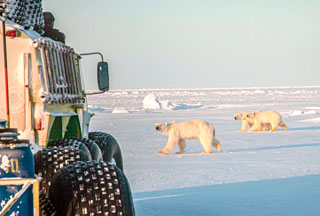
The thermometer shows - 35°C, however, polar explorer Zaitsev asserts that it is "twoscore", no less. He is hurrying up everybody to depart. Zaitsev has a strong motivation: the hunter sleeps in their vehicle, and to say simply that he snores is to say nothing. In Resolute our route and his route will diverge, and the workers of high latitudes will be relieved.
A leak appeared in the low-pressure hose of power steering of the yellow vehicle. It's plain terror: we bought in Toronto the most frost-resistant ATF, but it freezes already at 30 degrees below zero. On the average, our caravan of six vehicles is at a stop for about 1.5 hours a day due to repairs, because each cart wants to break down separately from the others. Most often the failures are minor ones, but the sum of downtime is quite substantial.
The weather is excellent. We saw a mother bear with two cubs, she is as lean as a cover girl, it seems that these two scamps are taking all the prey for themselves. They were curious, approached us to a distance of 20-30 meters. We made plenty of photos. By the evening we got stuck among the hummocks; Andrew persuaded me to try driving during dark hours; I agreed due to my cordial foible, we lost an hour and a half, passed 1 km and stopped for the night. In the morning, after climbing on the roof, I looked around, and in 20 minutes we were on flat ice, and an hour later we arrived to Resolute. Morning, evening, I hope that the rest you know yourself...
That's how the matters are. Yours V. Ye.
20.03.2022 Odometer reading - 1516 km
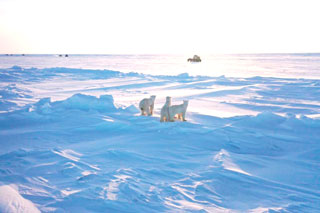
Last evening's meal: nelma liver and nelma caviar on a frying pan, 50 grams of whiskey, all in all - a modest proletarian dinner. The Vikings have sandwiches. We sympathize for them.
The morning is misty today, visibility approx. 100 m. We start moving among middle-grade hummocks. Then the terrain got more cheerful - good fast ice, Torfi was leading again (when there is no visibility they usually let me be the leader, our vehicles have a much better field of view), we covered 210 km in a day, lost two hours fiddling with the Ford's drive shaft. Viking Ayo demonstrated that spiritually he is like a Russian: he lies patiently under the vehicle which is supported only by the jack. Andrew Picard, at my suggestion, persuaded the fatalist to use our prop. All ended well. The evening is windless, it's mere resort here. Gavrilov salted one and a half kilos of fish in the evening. How could we manage without it! And poor, poor Maxim Badulin!
We are driving along the border of time zones, electronic devices switch from one time to another and back. By joint strain of mental efforts we set the alarm clock, but it did not work properly - this rascal rang as if at 4 o'clock, while actually it was only three. I made a decision to look only at the ordinary wristwatch, it is not prone to such trifles. After all, we are like chickens: it's the dawn that is important to us rather than the exact time. IMHO, we are not in China, where the whole country lives according to Beijing time, and nothing doing, they reproduce themselves successfully.
That's how the matters are. Till next communication session. V. Ye.
19.03.2022 N70°52', W97°50'. Clear sky, almost no wind.
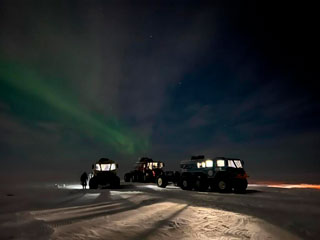
Yesterday we drove over hummocked ice (i.e. pressure ridges) for the first time. Hummock severity is about two scores by a five-score scale. The Fords move well, on the fields of smooth ice they outdrive us like a rocket. While we are driving slowly, especially the red vehicle, because the ice radar named after Christian Haas, the reputed glaciologist, is attached to its trailer. The radar is fixed on the rear side of the trailer on a bracket one and a half meters long, and there is a risk of breaking it when crossing ridges of hummocks. My vehicle, the green one, carries not only Konstantin Alexandrovich Gavrilov, but also the operator, Maxim Vasilyevich Badulin. He is a gentleman pleasant in all respects, and he pleased us still more with the news that fish is not his favorite meal. In the evening, upon completion of the creative process of perpetuating our feat, looking into the vehicle and asking what we have for dinner, he hears our joyful chorus - fish! Nelma, or inconnu, or Siberian white salmon, is a meal of the tsars, but "Generation P" prefers Rollton quick-cooking noodles. Most of the foodstuffs purchased by Dr. Larin to support the vital activity of the team are completely unsuitable (to our great despair). It is not the doctor's fault, he tried his best, but it is a different continent, and local concepts of delicious and healthy food are very different from European perceptions. And we could not bring our habitual foodstuffs, because the local customs inspectors are vigilant.
Everything goes not bad, we covered almost 200 km in a day, but God willing if only 120 km in the right direction. The ice radar indicates ice thickness from 1 to 2 meters. We saw a bear's trail, but we are not afraid, since we have a hunter with us. We rented a gun together with him in Cambridge Bay.
All the best, and keep in touch. V. Ye.
16.03.2022 -25-30°C, strong wind. Cambridge Bay.
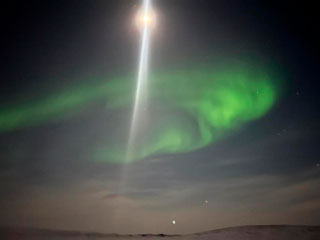
In the evening we drove into the glorious town of Cambridge Bay. The strong snowstorm has brought many refined shapes to the architectural appearance of this outpost of civilization on our way to the North. One can't see much in the darkness, and the day was long and laborious; therefore, right after aristocratic dinner consisting of a burger with a cutlet and a shower, we went to bed. The morning of the 17th greeted us by usual invigorating frost around 30°C with wind. The hangar workshop was furnished to us by Chris, an incredibly friendly, active and smart man in the plenitude of his power. Our lodging is located about 15 meters from the place of work, so the conditions for full-fledged rest of the workers are perfect.
People like Chris completely overturn the stereotyped opinion in Russia about Americans and Canadians as people with formal fixed smiles. By the way, a small trait: one of our guys was messing outdoors with the trailer; a stranger driving by on a snowmobile stopped, climbed over the snow ridge, helped, wished success and departed. Actually, nothing new - the higher the latitude, the better and more friendly is the attitude of humans to each other.
Regarding the vehicles: checking the hub assemblies, tightening of fasteners, replacing the ATF in the power steering with a more frost-resistant grade. The wheels: two discs having leakage through the weld seams were re-welded and painted.
We spent the second night in warmth and with sewage. In the middle of the day, some individuals came to the idea that it would be not bad to have a third overnight stay here... I suppressed the faint-heartedness with an iron hand, and at 17:00, in the rays of the setting sun, our chins proudly raised, we left the glorious town where you are greeted from every vehicle passing by, and moreover, the policemen do not notice the absence of license plates on our self-propelled vehicles.
That's how the matters are. Yours V. Ye.
15.03.2022 TRAVEL DIARY

Yesterday evening we arrived to Cambridge Bay. The day turned out to be a creative one, there was strong wind and snowfall in the morning, visibility appeared and disappeared from time to time. The distance remained to Bathurst Inlet was about 50 km over quite rough terrain with valleys separated by rocky ridges, with slopes of various steepness. The task of crossing them in the absence of visibility did not invoke much inspiration in our souls. But the Highest knows better whom to help in their endeavors, and at the right moment the visibility appeared to some or other extent, and finally by midday we got to the sea ice. In the afternoon, having left behind about 200 kilometers already, we expected to get to hot water supply by 6-7 p.m., but... "Welcome to Canada", strong wind has arose, and in conditions of zero visibility (sometimes it improved to 5-7 meters), staring at the navigator screen with one eye and at the windshield with the other, so that, in case of luck, to notice an ice block in time, pass it by, or at least minimize the blow, driving "by instruments" we arrived to the glorious village of Cambridge Bay. In the evening I went to the doctor, with a humble request to portion some ethanol for the purpose of treating strabismus, but the healing liquid was dosed in ruthlessly insufficient quantity. As is well known, selflessness in Russia is encouraged abundantly, but only verbally. In the middle of the strait, 15 kilometers from the village, the handsome white Ford hybrid failed, the electronics went wrong. Luckily, the ice there was smooth enough and allowed to tow it on a rope to the destination pint. The journey for this vehicle ended here. The other two Fords, of a simpler design, behave quite decently and demonstrate quite good cross-country ability, of course within the limits possible for vehicles of this type. I am pleased with the team, the relations with the Vikings are warm, the men are highly professional, in general, everything is fine, we are moving on. Tomorrow we have a rest day, and we will spend it in the garage with the vehicles.
That's how the matters are. Greetings to all! V. Ye.
12.03.2022 TRAVEL DIARY

The third day of travel. We enjoy the absence of endless reminders on timely passing of PCR and other tests. Tundra. It is happiness - to get to the places where you need not think whether you have a mask in your pocket or not. We found ourselves in tundra somewhat imperceptibly, the forest disappeared, and the vast expanses of the North opened. There are numerous caribou deer around. The deer here, I must say honestly, are just as stupid as in our homeland. Seeing the approaching caravan, they must run across the road in front of the vehicles as an absolute necessity. Always, without exceptions. But this only entertains us, and to some extent brightens up the monotony of driving over the terrain that is still flat. Now, briefly about our nomadic everyday life. The team is divided by the design differences of the vehicles. It's like women's footwear: high heels are beautiful, but uncomfortable for walking, and vice versa for felt boots. In our case, Fords are beautiful and drive fast, but living in them is not very comfortable. While we have "felt boots", they don't drive fast, but living in them is quite comfortable. Sometimes as many as eight romantics gather at the table during a friendly dinner and, to the best of their abilities and the extent of doctor's generosity, strengthen international cooperation and exchange of experience in the nomadic way of life. I am looking forward to refueling in Cambridge Bay with great interest to fuel consumption. This will be a good, reliable indicator for a sizeable section of the travel. The gasoline hybrid Ford demonstrates remarkable abilities in terms of voracity, the on-board computer sometimes shows with horror up to 70 liters/100 km. Its engine capacity is obviously excessive, only creating unnecessary difficulties when driving off-road. So far everything is fine with the weather, we are driving.
That's how the matters are, and so long till the next communication session. Yours V.Ye.
09.03.2022 The first day en route.

To be exact, this is not quite true (the first day) - four people, Zaitsev, Gavrilov, Dubinin and Elagin - unexpectedly happened to be en route yesterday evening. The matter is that after one of the operations of loading our ATVs on open platforms (local authorities did not permit us to ride 70 km by a public road), we had to follow them in a passenger car for the purpose of unloading at the beginning of the winter road. There was no point in returning to Yellowknife, and the four of us spent our first night in the vehicles. The working day started at 7 a.m. with the arrival of the other team members. Light repair, adjustments of steering in the red vehicle, of trailer suspensions at full load - and at midday we start driving, accompanied by a local ranger. After an hour and a half our caravan finally gains momentum, and by 6 p.m. we cover the planned distance of 150-160 km and stop for the night. An absolutely comic episode happened in the morning. Our hyper-responsible doctor, Sergey Alekseevich Larin, while preparing the vehicles for departure, bought all sorts of containers and formed four sets of them, one set per vehicle. However, he had no opportunity to evaluate the practical usefulness of these bulky plastic boxes of questionable quality, or he simply did not bother to think about it. After all, we just stuffed the contents of one such box here and there, but we could not dispose of the empty box, as there was pure ecology all around. The solution is simple - to distract the crew's attention and shove this horrible box into the stern of Larin's vehicle. Stealthily, like a young pioneer who has stolen a pie in the canteen, I sneak to the rear door and ... come face-to-face with Zaitsev, sneaking from the opposite side with a similar piece of plastic. We shove both boxes into the stern of the doctor's vehicle, and, bending with laughter, make off to our vehicles. I reassure myself by the fact that no criminal collusion existed, so the sentence will be without aggravating factors. The winter road is good, the nature is painfully familiar, and only absolute cleanliness both on the road and at parking lots is unfamiliar. The frost is about - 30°C, slight wind, the weather is exhilarant. We stopped at 6 p.m., tomorrow it would be good to cover about 300 km and move off this private road with super-strict rules for staying on it and finally pass to the vastness of the White Silence.
That's how the matters are. All the best, and till next communication session. Yours V. Ye.
February 20, 2022. Mississauga, day nine.
The day started anything but simple. Firstly, it is my birthday; secondly, the previous evening Zaitsev and Pavlov went out of their hotel room, but couldn't get back in again. The electronic lock did not respond to the cards. The gentlemen dressed slightly more than in the underwear stayed in the corridor, presenting a cheerless sight. Zaitsev went for lodging to Dubinin and Ershov's room, Pavlov spent the night in the premise allotted to him. During the breakfast it was found out that the safecracker specialists do not work on Sundays, and that Monday is a regional holiday - Family day. The locked room contained not only the dress of the polar explorers, but also the keys to the vehicle. At midday, in complete despair, I called the main person - Shakhnovsky. Less than 10 minutes later Zaitsev phoned me - the necessary specialist was found, the door was unlocked. That's how important is making a phone call at the right time to the right person.
Larin and Pavlov are shopping, the mechanicians are packing spare parts and tools. And I have completely forgotten one thing: when I woke up in the morning I realized that the ice radar sledge made from the procured materials, considering its bulkiness and weight, cannot be included in our caravan, so we make a bracket on the rear wall of the trailer on which we will place the instrument. Though it is not as secure as on the sledge, but this option is postponed until next year, when we will be able to prepare beforehand the materials of the right size, characteristics and weight. In course of sorting the equipment purchased for the journey, something is put aside for the reason of apparent duplication, something does not fit due to the fact that the ATV on-board network voltage is 12 V and 220 V, while all electrical appliances purchased via Internet are designed for 110 V. Perhaps it's for the best.
That's how the matters are. V. Ye.
Travel diary, day six.
Travel diary, day four
Mississauga 17.02.2022 Thursday evening. It is snowing outside, and it was raining all day.
Preparation for departure to Yellowknife goes on properly; in the morning Zurab left for rescuing the viking Torfi and succeeded in this; a magic letter from the Ministry of Tourism helped, hence, Torfi is free, and he even has a work visa for six months, so the family will not be left without a piece of bread.
Together with Zaitsev we ordered metal for a sledge carrying the ice radar, the contractors took the money benevolently (as usual), while the goods will be ready only tomorrow, though they promised to deliver it today by midday. Sergey Larin arrived today, tomorrow he will purchase foodstuff with Boris Pavlov and with all his energy. Someone of the mechanics will join them when the mechanical work is completed.
The whole day passed waiting for different deliveries. Everything arrives late; it is good luck if the delivered items are those that have been ordered. Sergey, the representative of "Sherpa" in Canada, is of great help. He sells, maintains, repairs "Sherpa" all-terrain vehicles. A young man, active, knowledgeable, friendly. He helped us to buy PE pipes for a sledge-catamaran carrying the georadar to measure ice thickness along the route. Christian Haas, reputed glaciologist from the Wegener Institute, asked us about this.
The sledge turns out to be quite cumbersome, but there is no other way to make it - it has to follow exactly the track of the trailer, otherwise it will quickly break down and fail in the hummocks on drifting ice; besides, it has to be amphibian. Despite proximity to a huge city, the assortment of foodstuffs, tools and all kinds of equipment leaves much to be desired. In reply to our groans, we hear from Zurab who lives here for 20 years: "Welcome to Canada." He is also far from idealizing the Canadian part of the British Commonwealth.
That's how the matters are. V.Yelagin.
February 16, 2022, Mississauga, industrial base.
Travel diary, day four
Toronto suburb, the actors are the same.
Zurab Sanikidze, our lifeline in the sea of problems surrounding us, is absent. An uncommon person, he managed to miss a flight to Boston for which he even had no ticket.
Therefore, he was forced to go to Boston by car. There it was necessary to pick up three pickups for Arctic Trucks and, together with his wife Maria and Torfi, to bring them here to Mississauga. Actually, Mississauga is not a suburb of Toronto at all, but, as revealed by recent scientific studies, a million-plus city, the sixth largest city in Canada.
Today's morning started well: foreman Gavrilov received a message from the Canadian anti-virus authorities that all of us are negative, nowadays this is the best news.
So, we are released from further self-isolation and may commence to perform our tasks. At about 10 a.m. Zurab called and informed in a voice full of optimism that he is to reunite with us in some three hours. Toward evening, another call: Zurab and his wife have just crossed the border and are heading home, but without a third car, without a trailer and without Torfi. That's what had happened: having arrived at the Canadian border, Torfi, in the simplicity of his soul, on the question about his plans in Canada answered, "I will get a vehicle with a trailer into shape, and then will go to the Arctic". In reply, the Canadian customs officials, with all possible benevolence, asked him to return to the United States, obtain a permit for working in Canada, register the trailer, and then return to the country of maple leaves and birches, with slanting rains between them - well, you know the song yourself... Presently the lonely Viking is sitting in a hotel on the American side of the famous waterfall, waiting for a work permit and registration of the trailer. Zurab is in great demand, we are in grief without him, without his much-needed help and knowledge of the terrain. Nevertheless, the work goes on, cargo is being packed, missing materials and tools are being purchased. The weather is good, with light frost, and for tomorrow the forecasters predict warming-up and Zurab's arrival.
That's how the matters are. V.Yelagin.
February 14, 2022, Mississauga, industrial base, a suburb of Toronto.

We haven't got moving anywhere yet - but the travel diary already exists; there is something indigenous in this, something ours, specifically Russian.
Now, then: travel plan for the year 2022.
12.02 - 19.02 The ATVs undergo the final check in Toronto
20.02 From Toronto, ATVs are transported by trucks to Yellowknife
25.02 The ATVs arrive to Yellowknife
26-28.02 In Yellowknife fresh food is bought, fish first of all, and cruise (i.e. large-sized) wheels are installed on the ATVs
01.03 Start of the expedition
Main points on the route: Yellowknife - Contwoyto Lake - Bathurst Inlet, Cambridge Bay - King William Island - Resolute - Meighen Island - outing to the ocean - Resolute. Scheduled time of the end of the travel: year 2022 - 31.03. 14.00 UTC-4.
Outdoor temperature is -15°C, the weather is fine. It would be even finer if our expedition warm jackets (they are called "parkas" for some reason) were waiting for us here in Toronto rather than in Edmonton. But indeed, sufferings engraft the will and strengthen the spirit. We are working, the trailers are completely assembled, suspension stiffness and toe-in angle are adjusted; cruise wheels are still being assembled, there are many of them - 35 wheels. We fixed some small leaks of antifreeze, we are sorting tools and various gear into barrels. The work is tedious, it requires care and accuracy. My heart is trembling-shivering in anticipation of arrival of Sergey Alekseevich Larin, in order I could transfer, with a feeling of relief, the burden of purchasing foodstuff and overall nutrition responsibility into his calloused hands. Zurab intended today to fly to the North American United States in order to pick up the pickups for the Arctic Trucks company, but alas - those very bats did not permit. He did pass the PCR test, but got the results right after end of boarding, so he let fly the bats and the aviation, and drove by car, no problem, the distance is just 1000 km; however, the way back is the same distance... He will return, approximately, ... well, when he manages to return; you know, truckers block the roads, in short, if only he would return. One of the Icelandic gentlemen will come with him, he will also prepare the vehicles for the travel, they will drive with us to Resolute, then will return to Yellowknife. While we will head further to the North, to Meighen Island, to the open ocean, in order to splash in the water, ride over ice hummocks, to see how the tires from TRECOL company behave, and take heroic photos. Then we will return to Resolute, perform maintenance of the machinery and treat it for preservation until next spring, when time will come to start moving again. This is the end of the program for the year 2022, then we will accumulate strength and nerves for the main journey, to the pole and to Greenland. It's interesting to have a look at the lands discovered by Eric the Red. An authoritative gentleman he was, according to rumors.
That's how the matters are. V.Yelagin.
February 13, 2022, Mississauga, a suburb of Toronto.
What an expedition starts from? In my opinion, this process may be divided into two stages: the first is the virtual preparation of a trip, designing the route, elaborating the idea, casting of participants, anticipation of wanderlust happiness (for those who understand).
And the second stage: meeting with reality, hassle, and once again hassle. Wrecked deadlines, these damned bats that have gifted the mankind with covid, strikers in all countries, prices that have magically soared to the sky, lunacy on the borders, - and only we, all dressed in white, persistently force through to our goal, ideally suited to the immortal saying of the great Cyrano de Bergerac (according to Rostand): "what is useless, is twice as wonderful". That's a joke. But actually, we bring warmth, light and kindness to the world. We, tractor drivers, finally broke through to hospitable Canada, and, despite the sabbatical ban and the ten-hour time lag, rushed to work. It's a pity that the work is not knee-deep in icy water, in that case it might be the real "How the Steel Was Tempered". The bottom line of the day: the trailers are almost assembled; assembly of the wheels - the process was streamlined, and it is gaining momentum. The workshop has been put in order, benches have been arranged. Frankly speaking, it was achieved not without strain, but there is hope that it will help to adapt faster to local zonal time.
That's how the matters are. V.Yelagin.